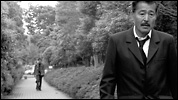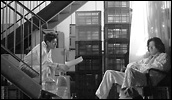Bright Future
- Year
- 2003
- Original title
- Akarui Mirai
- Japanese title
- アカルイミライ
- Alternative title
- Jellyfish Alert
- Director
- Cast
- Running time
- 115 minutes
- Published
- 20 August 2003



by Michael Arnold
Not so long ago, the future of Japanese film looked dark. Things are starting to brighten up, but current movies still seem to be groping around to find their new position in the world. Questions about the international presence of Japanese film used to be waved away with one magic word: Kurosawa. Today however, as ultraviolent gangsters and animated adolescent girls replace the samurai and geisha standards of yesteryear it feels like we're searching for a new Emperor to wear the crown. We've gone through the roll call once with no winner so far. Aoyama, Kawase, Kitano, Koreeda, Sabu, Tsukamoto, Miike, Miyazaki...
Next up in the rotation is Kiyoshi Kurosawa. Best known overseas for his spine-tickling horror flicks Cure (1997) and Pulse (2001), the B-movie and genre video expatriate has been creeping into the international circuit like a cold draft through the back door. Who knows, this Godard and Bava-fed rebel may become the next unlikely auteur to re-present "Japanese film" to foreign viewers.
You've probably heard it before: Kurosawa and Kurosawa, "no relation" and so on, but quips like these point less to useful comparisons and more to our continuing insistence to locate KUROSAWA in every Japanese movie we see. In postwar and cold war times, Akira gave many of us just what we wanted - a tangible, humanistic model of Japanese society. Kiyoshi on the other hand confronts us with ambivalent horrors and deconstructed stories, stretching our expectations of what fits onto a flat screen without projecting characters and situations we can easily "get into." He dares us to walk a tightrope away from the cinematic rules we were raised on while barely staying within entertainment's reach. In exactly this sense, Bright Future may be one of his most unbalanced films yet.
**Attention: detailed synopsis ahead**
Handsome twenty-something Yuji Niimura (Jo Odagiri) used to see bright dreams of the future, but now he works part-time at an oshibori (washcloth) laundry with his pal, Mamoru Arita (Tadanobu Asano). Mamoru keeps a deadly poisonous red jellyfish as a pet. "There might be a storm coming," Mamoru says. "If I make this signal [thumb pointing to his chest], it means 'wait.' If I do this [index finger pointing forward] it means 'go.'"
Boss Fujiwara (Takashi Sasano) wants to promote the two to full-time employees and tries to take on a more paternal role, inviting them to his home for dinner, borrowing CDs and so on. He barges into Mamoru's apartment one afternoon to offer some important life advice, but pathetically loses his train of thought and starts watching ping-pong on TV instead. When he tries to pet the jellyfish the young men don't warn him.
The next day, Fujiwara realizes his life was in danger and fires Mamoru. Mamoru gives Yuji the "wait" signal on the way out. At night, Yuji grabs a metal pipe and "goes" to the Fujiwara home to get revenge. Too late! Mamoru has already left most of the family dead. Mamoru is stuck in jail and Yuji is stuck with the jellyfish. Yuji visits his friend for guidance, however Mamoru has had enough. "I'm through with you." Confused and frustrated, Yuji knocks the fish tank over at home and the jellyfish slips through the floorboards and disappears.
Mamoru's estranged father Shinichiro (Tatsuya Fuji) arrives and tries to offer some feeble support, but his son has already made up his mind. He hangs himself in his cell, wrapping wire around his arm to finally give Yuji the "go" signal. Yuji decides to "go" help Shinichiro at his junk repair shop. Soon he's delighted to find that the jellyfish survived and is multiplying in nearby canals. He starts brewing buckets full of special feed to dump into the water until one afternoon when Mamoru's ghost suddenly appears and spoils all the fish food. Yuji panics again and runs away.
Now totally cut off from social life, Yuji is reduced to doing menial chores at his sister's boyfriend's office to support himself. He retreats to his beloved video game arcade and meets a gang of high school boys wearing Che Guevara print t-shirts. He takes them along to vandalize his office. They get caught; he escapes and returns to Shinichiro. Shinichiro forgives him, "I forgive all of you."
The jellyfish make their way out to the ocean while TV news reports warn about people getting stung. Shinichiro and Yuji watch the fish float away. "They'll come back." "When? In 10, 20 years?" Shinichiro sacrifices himself to a jellyfish. The two return to work. The schoolboys wonder whatever happened to Yuji after the burglary, and then go parading down the sidewalk like a well-groomed mob, with Che's daring t-shirted faces gazing in unison into the future. The title finally appears to tell us, "bright future."
Kurosawa is known for sticking together seemingly incongruous shots while leapfrogging over the expected details and narrative punctuation marks in his pictures. (In fact he recently polished Bright Future for Cannes by removing an additional twenty minutes of footage.) In scarier movies, this unsettling technique works exceptionally well. Here however, the disjointed scenes and abbreviated rhythm seem to be swimming against the current of a story that's actually quite straightforward, even melodramatic. Kurosawa himself has said that the sarcasm-tinted katakana of the title (Akarui Mirai) is in fact not sarcastic at all. He really is trying to show us a bright future, albeit bright from the point of view of the younger generation, not the adults.
Reviews are quick to explain that the director is treading in untested waters this time, although he obviously hasn't forsaken his darker genre roots yet. Bright Future has monsters, ghosts and murders, and you can feel the Horror seething and bubbling underneath a number of scenes (largely thanks to Asano's sublime acting). In fact, for such a groundbreaking film the story reanimates several expired ideas, surfacing somewhere between the black pathos of License to Live (Ningen Gokaku, 1999) and the translucence of Barren Illusion (Oinaru Genei, 1999). All the while, Michiko Kitamura's fashion showy wardrobe design (the Che t-shirts were her idea) and Takahide Shibanushi's obedient camerawork compose it all in a distractingly artsy atmosphere, as Kurosawa's odd pacing and continuity reach new heights of confusion that come dangerously close to compromising the whole experience. It's clear the director intended to make a movie that's hard to get a grip on, but I have to wonder if the audience will get anything at all or if they'll only feel a little sting as it slips through their fingers.
How are we supposed to watch it then? The best of Kurosawa's earlier films are so buoyant with allegory and veiled commentary that they haunt for days afterwards. License to Live's protagonist is delightful as a sort of walking, talking incarnation of Japan's "lost decade" during the Bubble era. Cure and Charisma (2000) pose scary questions about pre- and postwar politics, the Emperor system and modernization. Pulse isn't quite as sharp, but perhaps it tries to exorcise the fears of young adults who are about to cut their ties and officially enter society. (Kurosawa's take on hell? When there are no jobs left in Shinjuku, the unemployed will walk the earth!) Could Bright Future's young dandies themselves be like poisonous jellyfish, stinging innocent citizens around them as they swim towards freedom in the open sea? To be perfectly honest, I had a hard enough time just following the basic plot. Does a story about miscommunication and ambivalence need to be such a poor communicator itself?
Up to now Kurosawa has been able to resist the exoticism that often curses Japanese directors who release films internationally, so with luck his complex, un-Hollywood style won't find itself commandeered by the various stereotypes about culture and essentially "Japanese" traits. But at the same time, possibly for the same reason, I can't really imagine a story like this capturing a wide international audience. At any rate, I've heard far too many positive responses to simply dismiss the film, and given time the machinery of Kurosawa movies usually meshes quite well, but I'm still in the dark. Maybe I should just put the Bright Future on hold until I'm ready to not understand what it means. Or maybe that is what it means.